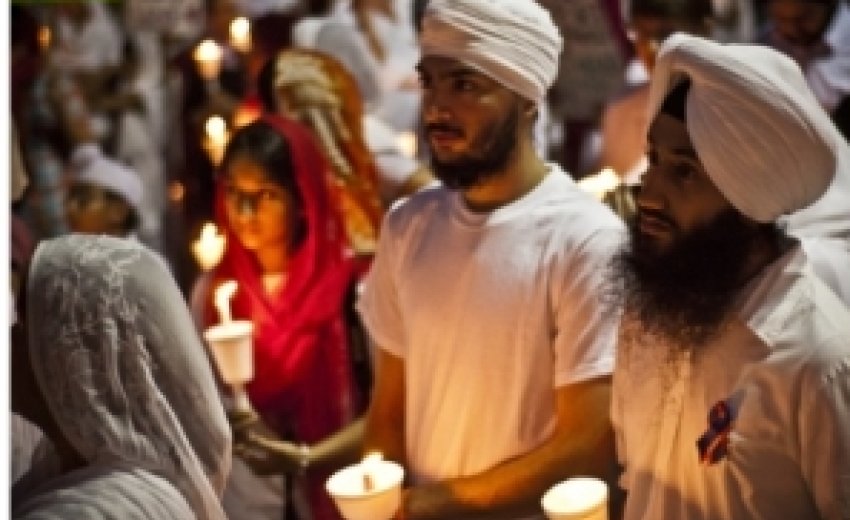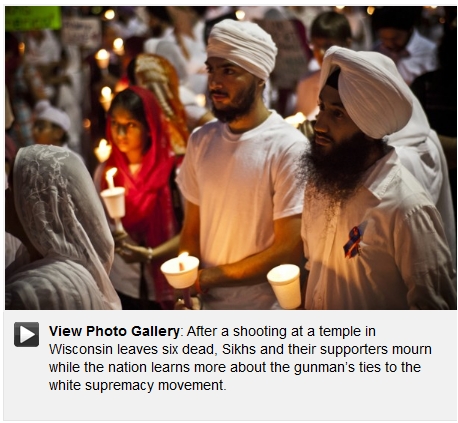|
Before September, 2001, I knew no Sikhs. Although I’m Jewish, I’ve become close friends with Sikh families, including the family of the first person murdered in the violent backlash following 9/11. Balbir Singh Sodhi's murder on Sept. 15, 2001, drew me into an ongoing vortex of concern for such attacks, which deepens each time I hear pundits, politicians and others foment fear and hate of people I'm quite certain they've rarely, if ever, personally known. In my compulsion to promote cross-cultural understanding, I strive to prevent such tragedies as the one that occurred in Oak Creek, Wisconsin, earlier this month. Last Friday I attended the funeral ceremony in Oak Creek, grieving the massacre there among thousands of other attendants. I was shepherded by Sukhdev Ghuman, the president of the Palatine Gurdwara, who took me under her wing as an ally to the community. I entered the high school gymnasium where the memorial was held before I realized I was about to file past open caskets of the six victims. They looked peaceful. I was in shock even though I've worried about such an act, in light of how effectively fear-mongers peddle their wares, seemingly careless for any collateral damage they cause. I was introduced to Jagjit Kaleka, the brother of the heroic president of the Oak Creek temple who died struggling to stave off the murderer. He greeted me with the warmest handshake and smile and told me his brother "did what he was meant to do” and was at peace. I felt like collapsing in grief but he and all the Sikhs around me seemed almost serene. They, apparently, had already transcended grief. There was not one murmur of anger, hate or even a sense of victimization. Instead, I felt their communal commitment to remain peaceful even in the face of violence. The community would not let that force win by pulling them into bitterness or vengefulness. There was no sense of inner struggle, whatsoever. [Emphasis - ED] There was grace, peace and sweetness. In their commitment to hospitality, Sikh ushers handed water bottles and wrapped vegetarian sandwiches down the rows. Looking at pictures of the funeral, you might assume from the many people wearing head-coverings that most people present were Sikh. But multitudes of attendants were either respectfully wearing their own hats or scarves or square bandanas provided at the service. But it was the turbans that most riveted me. I noticed for the first time the apparently infinite variations of how to create them. They seemed like intricate works of art, as individual as each wearer. I have used art since 9/11 to grapple with my concern for innocent people who suffer as a result of Islamophobic and xenophobic agitating by people who parlay stereotyping into votes, money and notoriety. I painted the twin towers with two men superimposed; instead of airplanes, guns were aimed. Destruction reverberated. My caption: "If hate is the problem, How can hate be the solution?" I wanted to evoke the innocent Sikh, Muslim, Hindu, Arab Christian and other innocent men murdered in America in the days and weeks following 9/11. I also sculpted a plaster figure of a man with a white turban holding a giant rose. It was surprisingly difficult to wind the turban. I wanted to understand the sweetness and ease I now associate with Sikhs, and somehow I thought that wrapping a band of cloth on a sculpted head could help me. I've read that turbans touch pressure points that promote calmness and clarity. Catholics, Jews and Muslims also utilize head coverings to impact consciousness. Yet it is turbans that have literally drawn fire upon Sikhs by those who denigrate them as "towels" or "rags.” Sikhs feed all who enter their house of worship and they would have happily fed the man who shattered their lives in Oak Creek. Rather than partake of their communion, he wrought destruction. While he created tragic, horrific loss and heartache in the Sikh community, he utterly failed in destroying that community. Almost immediately, they were calmly and resolutely restoring their peaceful sanctuary, which they also carry within. Anya Cordell is a speaker, writer, recipient of a 2010 Spirit of Anne Frank Award, and author of RACE: An OPEN & SHUT Case. |


